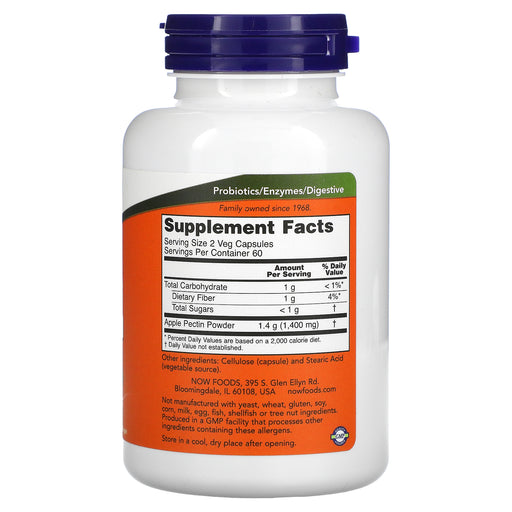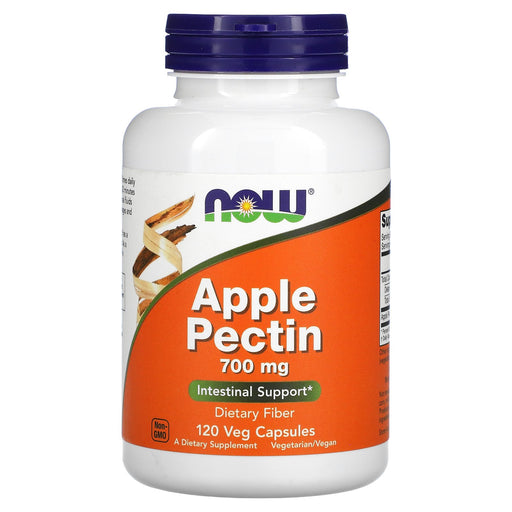
Harnessing the Power of Pectin for Digestive Health and Beyond
In the world of dietary fibers, pectin stands out as a multifaceted ingredient with a wide range of potential health benefits. Found naturally in the cell walls of fruits and vegetables, pectin is a soluble fiber that has been shown to support digestive health, heart health, and even weight management. As a supplement, pectin offers a convenient way to harness the power of this plant-based compound for overall well-being.
Understanding Pectin
Pectin is a complex polysaccharide that acts as a structural component in plant cell walls, particularly in fruits like apples, citrus fruits, and berries. It is commonly used as a gelling agent in food products, such as jams and jellies, due to its ability to form a gel-like consistency when combined with sugar and acid.
As a soluble fiber, pectin dissolves in water to form a viscous, gel-like substance that moves through the digestive tract, providing a range of potential health benefits.
The Health Benefits of Pectin Supplements
Incorporating pectin supplements into your daily routine may offer several notable health benefits:
- Digestive Health: Pectin acts as a prebiotic, providing food for the beneficial bacteria in the gut. By supporting the growth of these friendly microbes, pectin can help maintain a healthy gut microbiome, promote regular bowel movements, and reduce the risk of digestive issues like constipation and diarrhea.
- Heart Health: Studies have shown that pectin can help lower cholesterol levels by binding to bile acids in the gut and promoting their excretion. This process can help reduce the amount of cholesterol absorbed into the bloodstream, potentially lowering the risk of heart disease.
- Blood Sugar Management: Pectin's gel-forming properties can slow down the absorption of glucose in the digestive tract, helping to regulate blood sugar levels and reduce the risk of insulin resistance and type 2 diabetes.
- Weight Management: As a soluble fiber, pectin can promote feelings of fullness and satiety, reducing overall calorie intake and supporting healthy weight management.
- Immune Support: Some studies suggest that pectin may have immunomodulatory properties, helping to regulate the immune system and reduce inflammation in the body.
Choosing the Right Pectin Supplement
When selecting a pectin supplement, it's essential to choose a high-quality product from a trusted source. Consider the following factors:
- Source and Extraction Method: Look for supplements that use pectin derived from high-quality, organic fruit sources and gentle extraction methods to preserve the integrity and bioactivity of the compound.
- Purity and Potency: Choose supplements that are free from fillers, additives, and contaminants, and standardized to contain a consistent, effective dose of pectin.
- Complementary Ingredients: Some pectin supplements may include additional ingredients, such as other prebiotic fibers or digestive enzymes, to enhance the overall digestive health benefits.
Integrating Pectin into Your Health Regimen
To maximize the potential benefits of pectin supplements, consider the following tips:
- Start with a Low Dose: If you're new to pectin supplements, begin with a lower dose and gradually increase over time to assess your individual tolerance and minimize the risk of digestive discomfort.
- Stay Hydrated: As a soluble fiber, pectin absorbs water in the digestive tract. To support optimal digestive function and prevent constipation, be sure to drink plenty of water throughout the day.
- Pair with a Balanced Diet: While pectin supplements can provide valuable health benefits, they should be used in conjunction with a balanced, nutrient-rich diet that includes a variety of fiber-rich fruits, vegetables, whole grains, and legumes.
- Consider Complementary Supplements: To further support digestive health and overall well-being, consider pairing pectin with other beneficial supplements, such as probiotics, digestive enzymes, or omega-3 fatty acids.
Experience the Multifaceted Benefits of Pectin Supplements
From supporting digestive health and heart health to promoting weight management and immune function, pectin is a versatile and powerful plant-based ingredient that can offer a range of potential health benefits. As a convenient and concentrated source of this valuable soluble fiber, pectin supplements provide an easy way to harness the power of pectin for overall well-being.
Try our high-quality pectin supplements and experience the difference this multifaceted fiber can make in your journey toward optimal health. At Health Orchard, we're committed to providing you with the finest, most effective supplements to support your digestive health and beyond.
Frequently Asked Questions about Pectin
1. What are the benefits of taking pectin?
Pectin is a soluble fiber found in fruits and vegetables, particularly in citrus fruits and apples. Taking pectin supplements may offer several potential health benefits:
- Digestive health: Pectin can help promote regular bowel movements, alleviate constipation, and support the growth of beneficial gut bacteria.
- Blood sugar control: Soluble fibers like pectin can slow down the absorption of glucose, helping to maintain stable blood sugar levels.
- Cholesterol reduction: Pectin may help lower total and LDL (bad) cholesterol levels by binding to bile acids in the intestines and promoting their excretion.
- Satiety and weight management: Pectin can help promote feelings of fullness, reducing overall calorie intake and supporting weight management.
- Immune support: Pectin may help modulate the immune system and exhibit anti-inflammatory properties.
2. Can you take pectin as a supplement?
Yes, pectin can be taken as a dietary supplement. Pectin supplements are typically derived from citrus fruits or apples and are available in various forms, such as capsules, powders, and gels. These supplements are often used to support digestive health, blood sugar control, and cholesterol management. When taking pectin supplements, it's essential to follow the recommended dosage instructions and consult with a healthcare professional, particularly if you have pre-existing health conditions or are taking medications that may interact with pectin.
3. What is pectin medicine used for?
Pectin is used in medicine for several purposes:
- Digestive health: Pectin can help alleviate constipation, diarrhea, and other digestive issues by promoting regular bowel movements and supporting the growth of beneficial gut bacteria.
- Cholesterol reduction: Pectin may be used as a complementary approach to lower total and LDL (bad) cholesterol levels, alongside lifestyle modifications and other treatments prescribed by a healthcare professional.
- Wound healing: Pectin-based wound dressings can help promote healing and reduce inflammation in various types of wounds, such as burns, ulcers, and surgical incisions.
- Heavy metal detoxification: Modified citrus pectin (MCP) has been studied for its potential to bind to and facilitate the excretion of heavy metals, such as lead and mercury, from the body.
- Cancer adjuvant therapy: Some studies suggest that modified citrus pectin may help inhibit cancer cell growth and metastasis, making it a potential complementary treatment alongside conventional cancer therapies. However, more research is needed to confirm its efficacy.
4. What foods are high in pectin?
Pectin is a soluble fiber found naturally in many fruits and vegetables. Some of the best food sources of pectin include:
- Citrus fruits: Oranges, lemons, limes, and grapefruits, especially in the white pith and membranes
- Apples: Particularly in the skin and flesh of tart, firm varieties like Granny Smith
- Quince: A tart fruit related to apples and pears, often used to make jams and jellies
- Plums and apricots: Both fresh and dried varieties contain pectin
- Carrots: Especially when cooked, as heat helps release the pectin
- Pears: Most varieties contain pectin, with higher concentrations in the skin and core
- Berries: Strawberries, blackberries, and raspberries contain moderate amounts of pectin
5. What fruit is highest in pectin?
Citrus fruits and apples are generally considered the highest in pectin content among fruits.
- Citrus fruits: Oranges, lemons, limes, and grapefruits contain high levels of pectin, particularly in the white pith and membranes. The pectin content can vary depending on the ripeness and variety of the fruit.
- Apples: Firm, tart varieties like Granny Smith, Pippin, and crab apples tend to have the highest pectin content. The pectin is concentrated in the skin and flesh of the fruit.
Other fruits with relatively high pectin content include:
- Quince: A tart fruit related to apples and pears, often used in jams and jellies due to its high pectin content.
- Plums and apricots: Both fresh and dried varieties contain pectin, with slightly higher levels in the skin.
- Gooseberries and currants: These tart berries are often used in jams and jellies because of their high pectin content.
6. Is pectin good or bad for you?
Pectin is generally considered beneficial for health when consumed in moderation as part of a balanced diet. As a soluble fiber, pectin offers several potential health benefits:
- Digestive health: Pectin can help promote regular bowel movements, alleviate constipation, and support the growth of beneficial gut bacteria.
- Blood sugar control: Soluble fibers like pectin can slow down the absorption of glucose, helping to maintain stable blood sugar levels.
- Cholesterol reduction: Pectin may help lower total and LDL (bad) cholesterol levels by binding to bile acids in the intestines and promoting their excretion.
- Satiety and weight management: Pectin can help promote feelings of fullness, reducing overall calorie intake and supporting weight management.
It's essential to follow recommended dosages and consult with a healthcare professional if you have any pre-existing health conditions or concerns.










